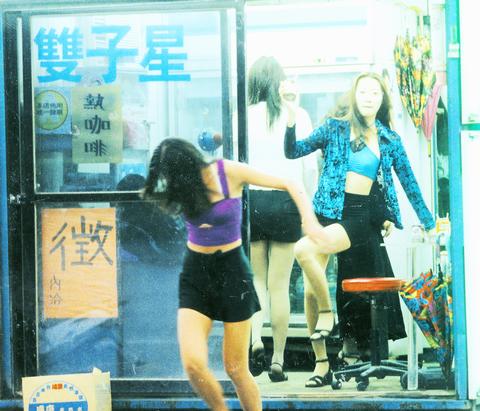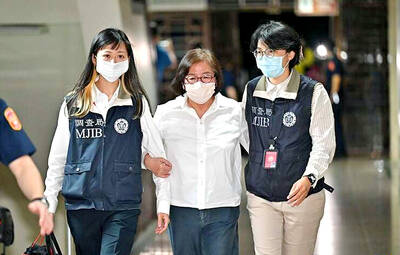Despite calls by a Taiwan Solidarity Union (TSU) legislator to crack down on "betel-nut beauties," the scantily-clad young women who sell the popular stimulant at roadside stalls are a part of Taiwan's culture and can't be easily outlawed, scholars and social critics say.
Betel-nut beauties are unique to Taiwan. Legislators, scholars, social workers and government officials say that because the women are a part of Taiwan's contemporary grassroots culture, cracking down on them isn't right.
Betel-nut beauties are found in a transparent kiosks along roads nationwide. They usually wear sexy clothing in order to catch the attention of drivers.

TAIPEI TIMES FILE PHOTO
In some cases, because of severe competition, betel-nut beauties in country areas have been known to wear nothing but a see-through dress.
"There's no way to get rid of the betel nut business in Taiwan," Minister of the Interior Yu Cheng-hsien (余政憲) said in an interview with the Taipei Times.
"Betel nuts have been a part of people's life in Taiwan. How can we only crack down on betel-nut girls, as traders hiring them are responsible?" Yu said.
Although betel-nut merchants have operated in Taiwan for decades, there are no official statistics on the industry. Nor does the government know how many betel-nut beauties there are in Taiwan.
According to industry estimates, there are roughly 100,000 kiosks selling betel nuts across the nation.
To attract more customers, vendors started hiring scantily-clad young women in 1996. When a few cases of prostitution associated with betel-nut vending became known, critics said the women were damaging the nation's moral climate and that government authorities had the responsibility to do something.
Wang Ping (王蘋), secretary-general of the Gender Sexuality Rights Association, said betel-nut girls are a unique social phenomena in Taiwan and nobody has the right to say they are indecent.
"When people accuse betel-nut girls of damaging the nation's moral climate, they should provide evidence proving what morals have been damaged and who has been bothered in society," Wang said.
Annoyed with negative media coverage, many of the women have refused to give interviews.
One woman, who spoke anonymously, said she would just get another job, such as working at a gas station, if the authorities want to crack down. "It's not a big deal to lose this job. I can just work for a gas station," she said.
Whether to hire young women to staff kiosks is a controversial issue among betel-nut vendors.
The owner of the popular brand A-Chiou, who only gave his surname, Fu, said, "hiring betel-nut girls to sell betel nuts is just a poor measure to stimulate business."
The hiring of young women has generated security concerns. To prevent the women from being harassed, some stall-owners have installed video cameras.
"I have no choice but to hire betel-nut girls, since all of my competitors are doing so," said one owner.
Chen Dong-sheng (陳東昇), a sociology professor at National Taiwan University, said the existence of betel-nut girls reflects how society views young women's bodies as commodities.
"Under tight competition, betel-nut vendors are just incorporating women's bodies into betel-nut vending. The measure obviously is meant to attract male betel-nut buyers," Chen said.
"This is no different from other industries commercializing wo-men's bodies," Chen said. "And if we want to crack down on betel-nut girls, other commercial products that use women's bodies [to make sales] should be treated in the same way."
Chen said the government should instead create and promote gender equality and learn why women go into the profession.
"An adult society should build an environment that is friendly to young women -- one that encourages them to avoid exploitation," said Chi Hui-jung (

Costa Rica sent a group of intelligence officials to Taiwan for a short-term training program, the first time the Central American country has done so since the countries ended official diplomatic relations in 2007, a Costa Rican media outlet reported last week. Five officials from the Costa Rican Directorate of Intelligence and Security last month spent 23 days in Taipei undergoing a series of training sessions focused on national security, La Nacion reported on Friday, quoting unnamed sources. The Costa Rican government has not confirmed the report. The Chinese embassy in Costa Rica protested the news, saying in a statement issued the same

Taiwan is to extend its visa-waiver program for Philippine passport holders for another year, starting on Aug. 1, Minister of Foreign Affairs Lin Chia-lung (林佳龍) said on Friday. Lin made the announcement during a reception in Taipei marking the 127th anniversary of Philippine independence and the 50th anniversary of the establishment of the Manila Economic and Cultural Office (MECO) in Taiwan, the Ministry of Foreign Affairs said. The decision reflected Taiwan’s commitment to deepening exchanges with the Philippines, the statement cited Lin as saying, adding that it was a key partner under the New Southbound Policy launched in 2016. Lin also expressed hope

Temperatures in New Taipei City’s Sindian District (新店) climbed past 37°C yesterday, as the Central Weather Administration (CWA) issued heat alerts for 16 municipalities, warning the public of intense heat expected across Taiwan. The hottest location in Taiwan was in Sindian, where the mercury reached 37.5°C at about 2pm, according to CWA data. Taipei’s Shilin District (士林) recorded a temperature of 37.4°C at noon, Taitung County’s Jinfeng Township (金峰) at 12:50 pm logged a temperature of 37.4°C and Miaoli County’s Toufen Township (頭份) reached 36.7°C at 11:40am, the CWA said. The weather agency yesterday issued a yellow level information notice for Taipei, New

CASE: Prosecutors have requested heavy sentences, citing a lack of remorse and the defendants’ role in ‘undermining the country’s democratic foundations’ Five people affiliated with the Chinese Nationalist Party (KMT), including senior staff from the party’s Taipei branch, were indicted yesterday for allegedly forging thousands of signatures to recall two Democratic Progressive Party (DPP) lawmakers. Those indicted include KMT Taipei chapter director Huang Lu Chin-ru (黃呂錦茹), secretary-general Chu Wen-ching (初文卿) and secretary Yao Fu-wen (姚富文), the Taipei District Prosecutors’ Office said in a news release. Prosecutors said the three were responsible for fabricating 5,211 signature forms — 2,537 related to the recall of DPP Legislator Wu Pei-yi (吳沛憶) and 2,674 for DPP Legislator Rosalia Wu (吳思瑤) — with forged entries accounting for